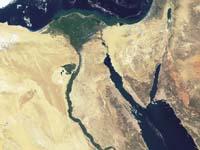The proliferation of fish on the Mediterranean coast is a product of fertilizers

The Nile delta, in which more and more fertilizers are used, has increased the fish population of the Mediterranean coast of the area. This has been pointed out by a group of researchers in the journal PNAS. Scientists analyzed in 2006-2007 600 fish collected in the Mediterranean. The results showed that algae and plankton eaten by fish were formed in waters with high nitrogen content. This has led to the following conclusion: The discharge of fertilizers and wastewater to the Nile deltara has increased the stock of fish in nearby Mediterranean waters.
The annual floods of the Nile previously fertilized the banks and reached the Mediterranean. To control these floods, the Great Aswan Dam was built in the 1960s. With three annual floods since then, the cured waters poured into the Mediterranean declined and fishing declined.
Since the construction of the Great Dam of Aswan, the Egyptian population has doubled, tripling the consumption of calories and meat and quadrupling the use of fertilizers. The spills generated by this have meant an increase in coastal fishing since the 1980s. However, in the long run, due to poor water quality, this can reduce fishing, according to researchers.





